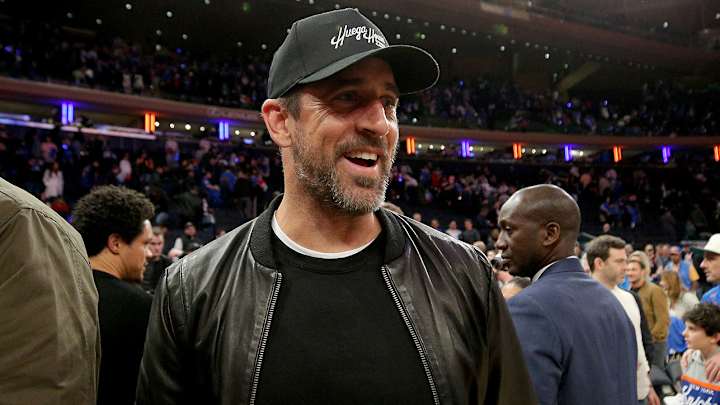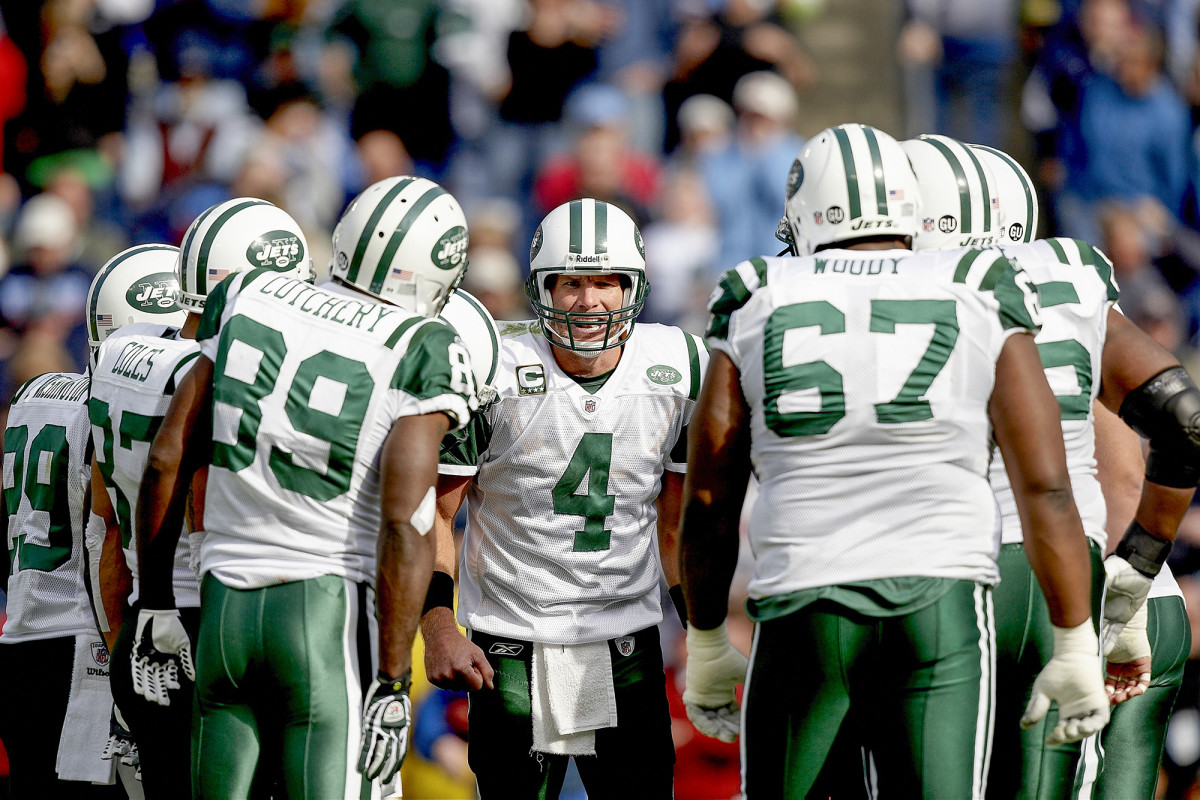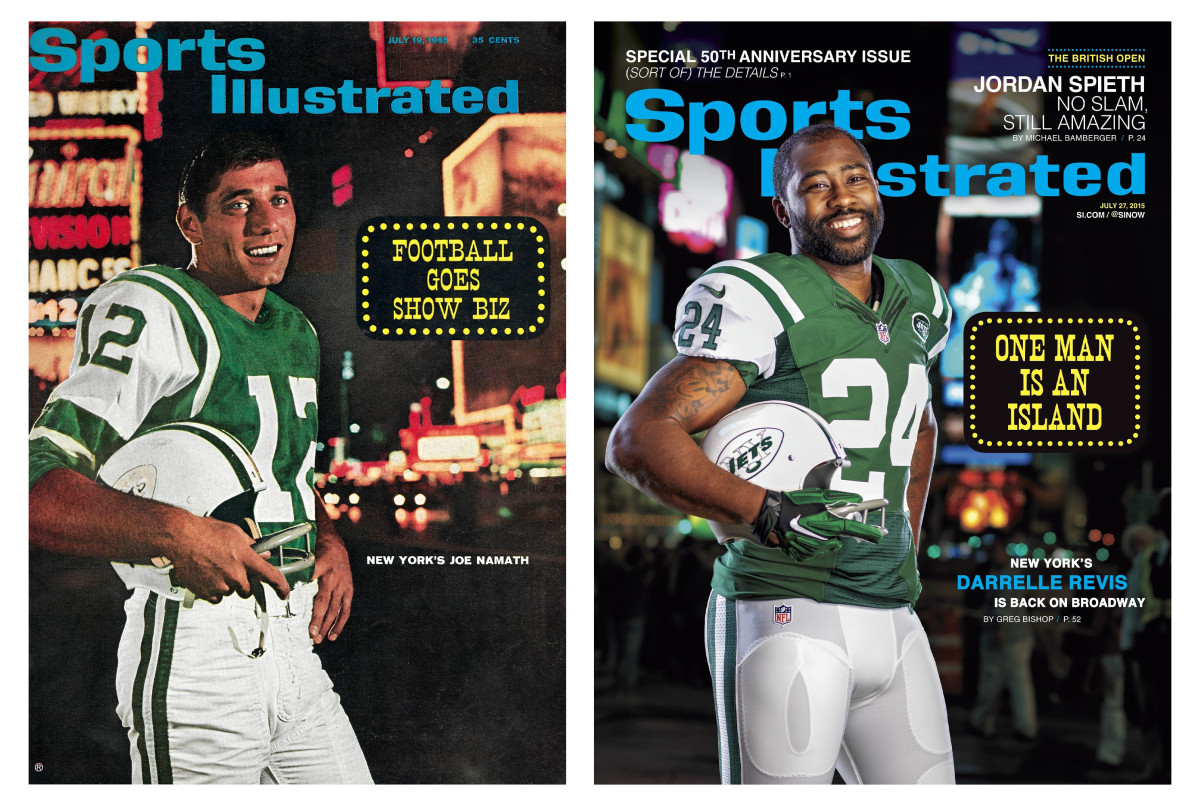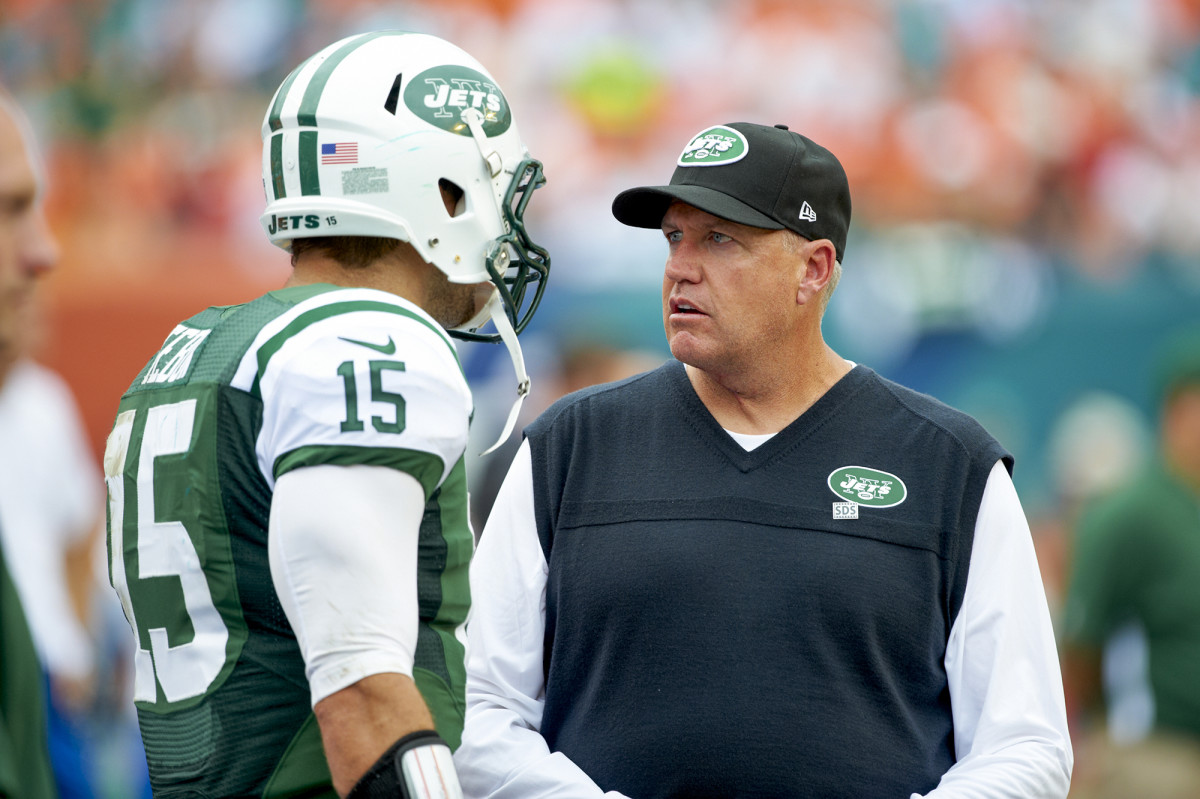An Open Letter to Aaron Rodgers About Surviving the New York Media

Dear Aaron,
The first thing you should know about the Jets beat is that Billy Joel gets us, the currents and formers, survivors and embracers. He could not have written “We Didn’t Start the Fire” about Gang Green. Nor could he have summoned a more perfect anthem for a franchise with no shortage of stars, star power, bad luck, ill-timed mistakes, ubiquitous drama or strange things that always seem to happen in the same place. Like the Jets, Mr. Joel spent many of his formative years on Long Island. An alternate “We Didn’t …” about the football team might start something like this:
JUM-BO-BIG KATT-BIG APPLE, HOW ‘BOUT THAT?
HERM-BOOMER-RICHARD TODD; AL TOON, OH MY GOD!
AARON GLENN-C-MART-VINNY T-GATE D-MAN-GIN-I;
EONS SINCE THE GUAR-AN-TEE.
PAR-CELLS, FAN HELL, WAYNE CHREBET … THIS IS THE JETS!
THEY DIDN’T START THE FIRE;
BUT THE JETS BEEN CHURNING, SINCE PRO FOOTBALL BEEN TURNING.
THEY DIDN’T START THE FIRE;
NO, THEY DIDN’T LIGHT IT, BUT THEY TRIED TO FIGHT IT …

Forget everything you might assume about the dreaded, scary, tabloid-driven, prop-up-and-pull-down New York media. It’s all exaggerated, a caricature that makes the gulf between your new market and other markets seem bigger than it really is. But that doesn’t matter, not for you, because there’s an important distinction to understand up front. You’re not just the latest superstar headed to a city that tends to Bunyanize or swallow elite athletes who dare to play there. You’re headed to Florham Park, N.J., to play for the J-E-T-S.
The Jets beat isn’t like the other ones. Inside the media room where you’ll do most of your interviews, near the cramped, windowless writer cubicles designed ostensibly for waterboarding, there is a fascinating, rivalrous, hilarious, competitive and often-mischaracterized group of human beings. They’re part of the New York media. And they’re very much apart from it as well.
For the longest time, the team these journalists chronicled was … sometimes good, rarely elite and always relevant. This made Jets stories juicier, overstuffed with tension, the kind that clicked before clicks mattered more than words strung together to evoke feelings, thoughts and reactions. That attracted all manner of, shall we say, distinct personalities to team headquarters. But it paled in comparison to the material. Perhaps you got a sense of that during the weeks it took to complete the trade?
In some ways, covering the Jets, as I did for The New York Times from October 2007 through the ’10 season, can resemble the sports journalism equivalent of war reporting. The stakes, of course, do not land in the same universe. But they can feel that way, morning after morning, when news—all sorts of random, odd, mystical, magical, head-scratching, none-of-this-makes-sense news—breaks with the force of a sledgehammer. In sum, the Jets are gonna Jet.
None of it makes sense. Except in totality, when, somehow, it all does.
The author and magazine writer Nicky Dawidoff parachuted in one year to profile Rex Ryan. He was more drawn to two longtime friends and media rivals adjusting to a rapidly changing industry, which he found worthy of a movie script. When my mentor, the author Gay Talese, tried to make a story I wrote on linebacker Bart Scott into a movie, Talese would ride over with me to home games, in my NYT-issued Pontiac Grand Am. He’d patrol the locker room afterward, amazed by the personalities, their stories, this telenovela of a professional football team. He’d never seen anything like it—and he famously wrote about Frank Sinatra, Joe DiMaggio, the mafia and a sexuality boom in America.
He saw what Joel didn’t see but expressed beautifully anyway.
BROADWAY JOE, STAGED A SHOW; LOMBARDI IN SB III.
MET LIFE, FAKE SPIKE, NO RINGS KISSED, THAT FOOT FETISH.
SANCHEZ-TEBOW-MCELROY, QUARTERBACKS YOU CAN’T ENJOY.
UH-OH, BUTT FUMBLE; JETS NATION, PURE DEFLATION;
MONDAY NIGHT MIRACLE OH-SO ANCIENT;
PLUS-NAPKIN RES-IG-NA-TION.
CAN’T WAIT-SPYGATE, LONG TIME SINCE A “SUPER” DATE;
DON’T YOU PLAY TO WIN THE GAME?
Hope the darkness retreat went well, Aaron, because now you’ve entered something that’s not dissimilar, the closest NFL equivalent. It’s more like a vortex of repetitive events that also aren’t repetitive at all. Everything changes: coaches, players, stadiums, philosophies, schemes, jerseys, even the particular oddities and scandals. The Jets do not. Covering them now is like covering them in 2020. And ’15. And ’10. And ’05. Jets time is a flat circle; team headquarters at 1 Jets Drive, a flat earth.
You must remember 2008, when the Packers shipped an aging legend to New York’s other football team to make room for a young, homegrown, promising potential star. This all sounds familiar, doesn’t it? For those of us who survived that summer, the events remain burned into our souls.
This was mere weeks after Peter King told me in a press box that I should fly down to Mississippi and show up at Brett Favre’s property gate, the hint being that he was headed to the Jets. (Peter’s always right, huh?) This was only months after I heard the best Jets beat story ever told—the time when tempestuous wideout Laveranues Coles (a personal favorite) saw a group of writers, singled out one he found diminutive in stature and screamed out, “What’s up, little media man? That ain’t no job! Writin’ paragraphs!” The story comes from more than a dozen sources, all of whom have sources. And this was months before I turned Favre’s well-worn narrative into a Mad Libs for fans to write their own version of his oft-repeated story.

For a while, Favre looked like the guy. Not just via his MVP candidacy that stretched and strengthened past the season’s halfway point. Not just for the Week 1 victory against Gang Green’s former czar (Bill Parcells) and starting quarterback (Chad Pennington) in Miami. And not just for afternoons like the Sunday when Favre threw six touchdowns to bludgeon the Cardinals.
No, Favre looked like the guy for all that and because of what he injected into a place that needed exactly what he brought. Verve, maybe. An edge. A new paradigm through which the franchise could view itself in a more positive light. Not entirely positive. More positive. It led to a foreign feeling: hope.
The Jets moved team headquarters to New Jersey that season. I remember flying with team owner (and future United States ambassador to the United Kingdom) Woody Johnson in his helicopter for a story. The view, of the palatial new digs in particular, was striking, from the solar panels on the roof to the juxtaposition of an impossibly white building with practice fields so green they looked spray-painted down below. Everything was new: building, state, team logo, quarterback. Johnson told me he had never anticipated a season more. After which, I wrote, “All the Jets have to do now is win.”
Watch the NFL with fuboTV. Start your free trial today.
The sentiment remains, nearly 15 years—and some 1,500 Jets-ian events—later. For a while, the Jets beat entailed writing about dominance. The team started 8–3. The whispers started after that. Favre had injured his arm; they went. It was serious, season-altering. By Dec. 21, Gang Green was lugging a 9–5 record to Seattle, on a weekend replete with more snowfall in the Emerald City than at any time in the previous decade.
That might be the most memorable of so many memorable trips on the Jets beat. Favre could hardly throw, as this season, like so many other seasons, disintegrated in its own distinct way. The Jets didn’t even make the playoffs. Favre retired after that season. Again. He unretired after that. Again. The Jets brought in a new coach. Again. They drafted another first-round quarterback. Again. They flashed immense promise. Again. They didn’t win the Super Bowl. Again and again—and again.
In the 14 seasons that followed 2008, they made the playoffs twice—twice!—in ’09 and ’10. In the 12 seasons after that last appearance, they finished last in the AFC East seven times. They let go of a Hall of Fame cornerback in Darrelle Revis and brought him back, hope building once more, as Sports Illustrated recreated the famous cover shot of Joe Namath posing in Times Square with the cornerback/island. Six quarterbacks followed Favre. Four coaches followed Eric Mangini. Defensive emphases followed offensive ones. Players’ coaches followed disciplinarians. The Jets changed. And changed. And changed.
Everything, that is, except the beat.

MAN-GOLD-FAVRE-OLD-KEYSHAWN-LE’VEON; AND A ROYAL TANN-EN-BAUM.
F’IN-A MA-WAE, HOW BAD DID WE LOSE TODAY?
GENO SMITH-RYAN FITZ-KENNY O-DAR-NOLD;
GANG GREEN, NOT THAT MEAN, SUCKER PUNCHED, LOSSES BUNCHED;
EVEN FANS RETIRE.
Rex Ryan, at least, proved entertaining. His six-year tenure was so—surreal? outrageous? bizarre?—that dozens of lists summarizing the myriad events exist. Ryan made a movie cameo and wrote a best-selling book. He joked about considering whether to poison Peyton Manning’s food. He referred to his quarterback, the latest rookie darling, Mark Sanchez, as “my baby.”
Ryan gave the NFL an epic introductory speech, a promise to never kiss Bill Belichick’s rings, press conferences with props (like tissues) or costumes (like the time he “dressed up” as his brother, Rob). He gave the HBO docuseries Hard Knocks its best-ever quote—Let’s go eat a goddamn snack! He beefed with linebackers on other teams (like Channing Crowder) and defensive backs (hello, DeAngelo Hall). He navigated DUIs, underage dating scandals and locker room strife. He swapped outfits … in the stands … at a hockey game, flipped the bird at an MMA fight, wrote “soon to be champs” on an ESPN bus, compared his, um, handsome bearing to Tom Brady, had Sanchez’s likeness tattooed on his leg, yelled “Shut the f--- up!” at a fan who probably deserved it, recruited Tim Tebow to his circus and then celebrated a shirtless Tebow training camp jog in pouring rain.
One newspaper summarizes his tenure for me. It’s from the Post, from 2010. On the back page, several of us are pictured interviewing him, along with gossip columnists and celebrity news channels, about a “scandal” that was brewing over a video that appeared to feature Ryan and his wife and their apparent … shared foot fetish. Fantasy fiction would have been more realistic. The front-page headline grabbed a bullhorn and screamed: AGONY OF DA-FEET!
I wiggled off the Jets beat after Ryan’s team lost its second consecutive AFC championship game in early 2011. Nothing changed. Not even after Ryan left. First, he benched Sanchez for Greg McElroy (’12). Fireman Ed, the franchise’s most notable fan, “retired” (’12) right around when #QBsBetterThanSanchez trended on Twitter. Answers ranged from Bubba Watson to Burt Reynolds. Ryan reportedly gave Tebow the cold shoulder (’12 again!). He crashed his red Ford Mustang (!!) (’13). He played Sanchez in a preseason game against the Giants (also ’13), behind a backup offensive line, only to watch a pass rusher injure the quarterback’s throwing shoulder.
Ryan soon made the Jets’ password on their playbook iPads 1-9-6-9 (2014), a nod to the franchise’s first and only Super Bowl triumph. All they had to do was win. They didn’t win much at all. A teammate sucker punched Geno Smith (’15). Sam Darnold came down with mono (’19). The Jets lost one game against the Raiders by calling an all-out blitz without precedent in NFL history: final 15 seconds, down 4–8 points, 40+ yards to the end zone (’20). It didn’t seem like current scribes used Same Old Jets anymore. The word Jets eliminated the redundancy.

Remember, Aaron, I traveled to Green Bay in 2011 to write about your apprenticeship, all your notable and laudable development. It seemed like you might be a Packer forever. It seemed that way with Favre, too. But here we are. Here the Jets are. Everything has changed, and nothing has. Flat circle, flat earth, “We Didn’t Start the Fire” playing on an endless loop.
Here’s a piece of unsolicited advice: It’s hard to find a Jet from this century who finished his career there entirely unscathed, universally beloved, untinged by the events that no one, it seems, could escape. The ones who seem to be remembered more fondly—like Ryan, or, say, loquacious linebacker Bart Scott, a personal favorite who had his share of media run-ins and is now a member of the media—tended to embrace the chaos, the circus, the never-ending J-E-T-S crucible that mixes embarrassment, promise and relevance with good teams, bad ones and the occasional team or coach or star that promises to end the cycle. Maybe you’re that guy. Maybe no one ever will be. Regardless, this experiment, the Jets’ latest, promises to be interesting, fascinating, a train wreck or a train repair that happens while the J-E-T-S caboose rumbles down the same track, forever and for always.
Take it from Mr. Joel. Or from what he might have written, anyway.
SAME OLD JETS? NOT JUST YET.
WILSON-WILLIAMS-MOSLEY-SAUCE; AND A-ROD, TO END LOSS AFTER LOSS.
PATS-BILLS-DOL-PHINS; CAREFUL, THERE’S HOPE AGAIN.
THEY DIDN’T START THE FIRE;
BUT THE JETS BEEN CHURNING, SINCE PRO FOOTBALL BEEN TURNING.
THEY DIDN’T START THE FIRE;
NO, THEY DIDN’T LIGHT IT, BUT THEY TRIED TO FIGHT IT …
